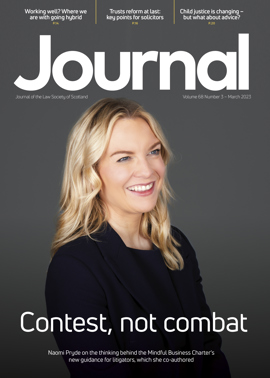Succession: Non face-to-face will instructions; form C1

At the start of the Covid-19 pandemic, solicitors quickly adapted to holding online client meetings over Zoom and other video platforms. The lockdown rules also presented practical challenges when witnessing or certifying deeds. Thankfully such burdensome restrictions are no longer in place, but situations may still arise where it might be necessary or sensible for solicitors to take instructions or execute deeds without meeting a client in person.
The Guidance on non face-to-face will instructions has been reviewed and updated, and readers are advised to read this in full. The Vulnerable Clients Guidance may also be relevant.
The former reiterates that it will rarely be appropriate to delay the completion of a will. It provides advice and information on how to comply with your professional obligations when it is not possible to meet your client in person.
Taking instructions remotely
1. Existing clients
You can act on the instructions of an existing client, but you should ideally have a video call to satisfy yourself that the client has capacity and there is no concern over undue influence or circumvention. When there is any doubt over any of these factors, a meeting in person and/or further investigations should be carried out before proceeding.
2. New clients
Refer to the Guidance on non face-to-face identification and verification. It will be more difficult to assess capacity of a new client and check for undue influence, and this should not be done solely over the telephone. As above, if there is any doubt, instructions should be declined unless and until you can meet in person and/or investigate further.
3. Instructions where no visual contact is possible
This would severely limit the actions you can take. You could advise the client that they can write out their own will or codicil. You could explain the requirements of formal validity, although subscription alone will generally create a valid testamentary writing. There are obvious risks with DIY wills, but in some instances
(or as an interim measure), it could be better than nothing.
Execution of wills
1. In-person witness available
The will can be posted or emailed (preferably in a format which cannot be altered) to the client for signing. The client can then sign and have the will witnessed in the usual way.
2. No in-person witness available
If a suitable person is not available to be physically present at signing, the solicitor or another suitable person can act as witness by video call.
Steps to take:
- Provide the client with the will in advance of the video call, either by post or email.
- The video call should be used as a further opportunity to assess the capacity of the client and, using their professional judgment, the solicitor can consider whether any undue influence is being exerted on the client.
- The client should not sign the will in advance of the meeting.
- The client should show the unsigned will to their camera for the solicitor and/or other person to see on their screen(s).
- The client should sign the will, then add the place and date of signing on the last page where indicated. The client should then show the solicitor the signed will.
- The client should be instructed to return the signed hard copy promptly to the solicitor or send it to the other person who has witnessed signing. The Society considers that the witness, as long as they are satisfied that the client has actually signed each page, can on receipt of the signed will, legitimately sign and add their full name and address. The witness should add their signature as soon as is reasonably practicable. It is considered that this may be deemed to form one continuous process, as required by the legislation, although there is no authority on this point. If it were held in the future that this is insufficient to constitute one continuous process, the key point is that the client will have signed a fully valid will, which can then be “set up” as part of the confirmation process if required.
- If another person has acted as witness, the will should be sent to them to sign in the first instance and thereafter return it to the solicitor after the witness has completed their signing formalities.
3. No witness available
Where no witness is available to be physically present and there are no video facilities, the client’s signature alone is effective to make a valid will. However the will would need to be “set up” as part of the confirmation process. The need for this additional step should be explained to the client and the solicitor should note on file that this advice has been given. If there is an opportunity to replace the will or codicil with a witnessed version, that should be done at the earliest opportunity.
Where video calls are used, it is possible to record the call and store it. However, you will need the client’s consent to do so, and you should consider data protection implications.
Commissary issues
The Scottish Courts & Tribunals Service has reported that the return rate for confirmation applications has been particularly high recently, averaging 24-30% across the busier courts.
One of the most common reasons relates to the changes to HMRC forms last year. Readers are directed to some recent articles covering IHT reporting, and the links from these to HMRC and SCTS pages: “Changes to IHT reporting requirements”, Law Society news, 26 January 2022; “Commissary: the top 10 failings”, Journal, September 2021, 47.
Perspectives
Features
Briefings
- Civil court: No rule against redaction
- Corporate: Privileged or confidential – who can access
- Intellectual property: Big tech, AI and enforcement
- Succession: Non face-to-face will instructions; form C1
- Agriculture: “Route map” for agricultural reform
- Parking: About this ticket…
- In-house: Caring for the carers







